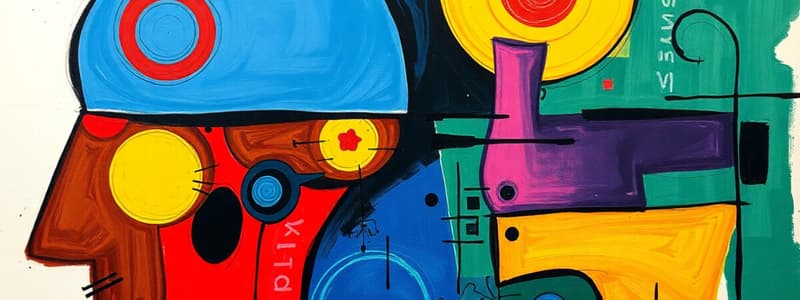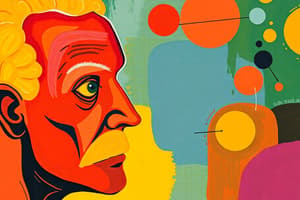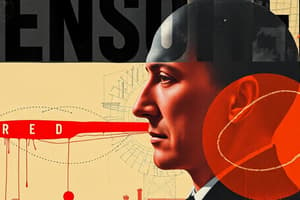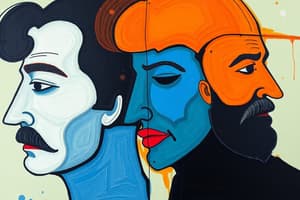Podcast
Questions and Answers
What psychological concept did Freud use to describe the child's attachment to their mother?
What psychological concept did Freud use to describe the child's attachment to their mother?
Which part of the psyche is described as functioning under the pleasure principle?
Which part of the psyche is described as functioning under the pleasure principle?
According to Freud, what aspect of human behavior is largely influenced by unconscious processes?
According to Freud, what aspect of human behavior is largely influenced by unconscious processes?
In Freud's model, which element of the psyche serves as the moral compass or ethical guideline?
In Freud's model, which element of the psyche serves as the moral compass or ethical guideline?
Signup and view all the answers
What is the primary function of the id according to Freud?
What is the primary function of the id according to Freud?
Signup and view all the answers
What does Freud mean by describing the id as 'lawless and amoral'?
What does Freud mean by describing the id as 'lawless and amoral'?
Signup and view all the answers
What mental processes does Freud classify as 'unconscious'?
What mental processes does Freud classify as 'unconscious'?
Signup and view all the answers
How does Freud relate the id to the concept of the Devil?
How does Freud relate the id to the concept of the Devil?
Signup and view all the answers
What theme does the image of the tree primarily represent?
What theme does the image of the tree primarily represent?
Signup and view all the answers
What is a defining characteristic of a symbol in literature?
What is a defining characteristic of a symbol in literature?
Signup and view all the answers
What poetic structure is used in 'Ozymandias'?
What poetic structure is used in 'Ozymandias'?
Signup and view all the answers
What is the rhyme scheme of the sonnet 'Ozymandias'?
What is the rhyme scheme of the sonnet 'Ozymandias'?
Signup and view all the answers
Which of the following best describes the condition of the statue in 'Ozymandias'?
Which of the following best describes the condition of the statue in 'Ozymandias'?
Signup and view all the answers
Who is Ozymandias a Greek name for?
Who is Ozymandias a Greek name for?
Signup and view all the answers
What literary device is prevalent in the poem 'Ozymandias'?
What literary device is prevalent in the poem 'Ozymandias'?
Signup and view all the answers
How does the inscription on the pedestal of the statue impact the reader?
How does the inscription on the pedestal of the statue impact the reader?
Signup and view all the answers
What does Hamlet's view of Denmark represent in his reflections?
What does Hamlet's view of Denmark represent in his reflections?
Signup and view all the answers
What sentiment does Hamlet express regarding the world he inhabits?
What sentiment does Hamlet express regarding the world he inhabits?
Signup and view all the answers
Which theme is prominently featured in Hamlet's sentiments about nature?
Which theme is prominently featured in Hamlet's sentiments about nature?
Signup and view all the answers
What is reflected in Claudius's words as he attempts to pray for forgiveness?
What is reflected in Claudius's words as he attempts to pray for forgiveness?
Signup and view all the answers
What is the main goal of the journey described?
What is the main goal of the journey described?
Signup and view all the answers
What does Hamlet's use of riddles and double meanings signify?
What does Hamlet's use of riddles and double meanings signify?
Signup and view all the answers
How does Hamlet feel about his mother's remarriage?
How does Hamlet feel about his mother's remarriage?
Signup and view all the answers
How is disability culturally perceived according to the content?
How is disability culturally perceived according to the content?
Signup and view all the answers
What is a significant aspect of the theme of doubleness in the play?
What is a significant aspect of the theme of doubleness in the play?
Signup and view all the answers
What does the shadow archetype represent?
What does the shadow archetype represent?
Signup and view all the answers
In the context of Hamlet's struggle, what does 'man's having to tolerate earthly existence' imply?
In the context of Hamlet's struggle, what does 'man's having to tolerate earthly existence' imply?
Signup and view all the answers
What does the wise old man archetype provide during the hero's journey?
What does the wise old man archetype provide during the hero's journey?
Signup and view all the answers
What must happen for a hero to fully integrate with their shadow?
What must happen for a hero to fully integrate with their shadow?
Signup and view all the answers
Which of the following is NOT considered an archetype mentioned in the content?
Which of the following is NOT considered an archetype mentioned in the content?
Signup and view all the answers
How does the mother archetype affect the development of the hero's personality?
How does the mother archetype affect the development of the hero's personality?
Signup and view all the answers
What happens if the shadow remains unconscious?
What happens if the shadow remains unconscious?
Signup and view all the answers
What does the increasing identification of children as 'multiracial' suggest about the concept of race in the United States?
What does the increasing identification of children as 'multiracial' suggest about the concept of race in the United States?
Signup and view all the answers
How is 'race' primarily interpreted by historians and social scientists according to the content?
How is 'race' primarily interpreted by historians and social scientists according to the content?
Signup and view all the answers
What ambiguity is associated with the concept of 'multiculturalism' as discussed in the content?
What ambiguity is associated with the concept of 'multiculturalism' as discussed in the content?
Signup and view all the answers
What is suggested about mainstream culture in relation to marginalized cultures?
What is suggested about mainstream culture in relation to marginalized cultures?
Signup and view all the answers
In the interpretation of Shakespeare's Hamlet, what is emphasized by the context surrounding Claudius's conversation?
In the interpretation of Shakespeare's Hamlet, what is emphasized by the context surrounding Claudius's conversation?
Signup and view all the answers
What point is made about the incorporation of multicultural or ethnic texts in mainstream literature?
What point is made about the incorporation of multicultural or ethnic texts in mainstream literature?
Signup and view all the answers
Which statement reflects a key criticism of complacency in ethnic or cultural politics?
Which statement reflects a key criticism of complacency in ethnic or cultural politics?
Signup and view all the answers
What does Rosencrantz's speech in Hamlet metaphorically suggest about leadership?
What does Rosencrantz's speech in Hamlet metaphorically suggest about leadership?
Signup and view all the answers
What do the names Rosencrantz and Guildenstern imply about their characters?
What do the names Rosencrantz and Guildenstern imply about their characters?
Signup and view all the answers
How do Rosencrantz and Guildenstern react when questioned by Hamlet?
How do Rosencrantz and Guildenstern react when questioned by Hamlet?
Signup and view all the answers
What commission does Claudius send Rosencrantz and Guildenstern to carry?
What commission does Claudius send Rosencrantz and Guildenstern to carry?
Signup and view all the answers
What literary device is used in describing the King’s sigh as a general groan?
What literary device is used in describing the King’s sigh as a general groan?
Signup and view all the answers
What thematic concept is suggested by Hamlet's view of Rosencrantz and Guildenstern?
What thematic concept is suggested by Hamlet's view of Rosencrantz and Guildenstern?
Signup and view all the answers
What does Hamlet mean by referring to the two characters as 'adders fanged'?
What does Hamlet mean by referring to the two characters as 'adders fanged'?
Signup and view all the answers
In planning for revenge, which strategy does Hamlet consider regarding Rosencrantz and Guildenstern?
In planning for revenge, which strategy does Hamlet consider regarding Rosencrantz and Guildenstern?
Signup and view all the answers
How does Horatio react to the fate of Rosencrantz and Guildenstern?
How does Horatio react to the fate of Rosencrantz and Guildenstern?
Signup and view all the answers
Study Notes
Criticism: Theory and Practice 19th & 20th Centuries
- Course Title: Criticism: Theory and Practice 19th & 20th Centuries
- Course Code: BU_FART_ENGL49
- Program: English Language & Literature
- Course Instructor: Prof. Iman Adawy Hanafy
- Fourth-Year course
- Focuses on 20th-century criticism, also called the Age of Criticism.
- Designed to identify and understand the various critical trends of the 20th century.
- Explains how to apply the trends to literary works.
- Includes major disciplines like Psychology and Marxist dialectics.
- Examines Freudian and Jungian theory's use in literary analysis.
- Includes anthropological methodology and the technique of close reading (New Criticism).
- Emphasizes Feminist and Multicultural literary criticism from the latter half of the 20th century.
- Covers the historical approach of New Historicists, such as Stephen Greenblatt.
Contents
- Introduction
- A Survey of Twentieth Century Theories
- Traditional Criticism (Historical/Biographical)
- Traditional Criticism in Practice
- Russian Formalism and New Criticism
- Formalistic Criticism in Practice
- Reader-oriented Criticism
- Reader-oriented Criticism in Practice
- Psychoanalytic Criticism
- Psychoanalytic Criticism in Practice
- Cultural Studies
- Cultural Studies in Practice
- References
Introduction
- Literary criticism is the study, interpretation, and evaluation of literature.
- It's the practical application of literary theory to literature.
- It involves defining, classifying, interpreting, and evaluating literary works.
- Literary theory provides the general principles, terms, characteristics, and categories for analyzing literature.
- Theory and practice interact in criticism.
- The true critic understands the underlying meaning of literary works and shows them to the reader.
- Critical views are divided into three groupings: formal, social and personal or individual.
Formalism
- Began in England with I. A. Richards's Practical Criticism (1929).
- Encouraged close reading of texts rather than relying on biographical information.
- Stresses the importance of literary form in determining the meaning of literary works.
- Examines a literary work in isolation, not considering external elements like biography or history.
- Aims to develop a theory of literature using the technique and structure of the work itself, not the author.
Structuralism
- Rooted in linguistics and anthropology.
- Views literature as a system of signs with inherent meaning.
- Examines the relationship between signs in the text.
- Rejects the notion of a privileged authorial, temporal or social context in understanding a work.
- Language is interpreted as a system of relationships and structures (e.g., binary oppositions)
Deconstruction
- Originated as a reaction against structuralism's emphasis on order.
- Finds disorder and a constant tendency for language to undermine its apparent meaning.
- Argues that texts are not fixed meanings, but have unstable and open ended meanings.
- Every text contains ingredients that undermine its system.
Sociological Criticism
- Literary works reflect society and have meanings derived from social circumstances.
- Analyzes the role of social and economic contexts within the work.
Feminist Criticism
- A reaction to male dominance and female subordination in society and literary works.
- Focuses on female stereotypes and characteristics in literature.
- Considers how women are depicted and oppressed in texts.
Marxist Criticism
- Analyzes literature based on social and economic theories of Karl Marx and Friedrich Engels.
- Emphasizes the class struggle and the role of politics.
New Historicism
- Views literature as a cultural product within a specific historical period.
- Interprets literature as a reflection of the power structures and ideologies of its time.
Psychoanalytic Criticism
- Views literature as an expression of the inner workings of the human mind.
- Examines the unconscious motivations, desires and conflicts within the characters of the text.
- Often uses concepts from Freudian and Jungian psychology.
Reader-Response Criticism
- Emphasizes the reader's active participation in creating meaning.
- Recognizes that meaning isn't inherent to a text, but is constructed through the reader's interaction.
- Focuses on how the reader's experiences, values, and attitudes influence their understanding and interpretation of a text
Studying That Suits You
Use AI to generate personalized quizzes and flashcards to suit your learning preferences.
Related Documents
Description
Test your understanding of Freud's psychological concepts, including the id, ego, and superego, and how they relate to human behavior. Explore his influential ideas on unconscious processes and literary symbolism, specifically in the poem 'Ozymandias'. This quiz will challenge your knowledge of both psychology and literature.




